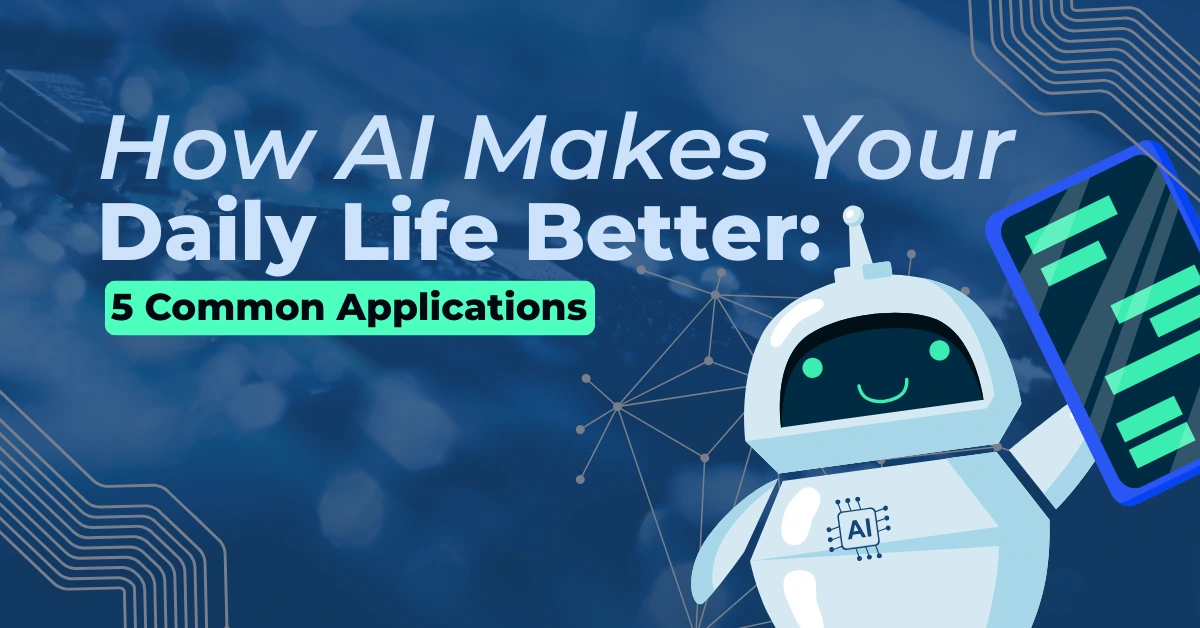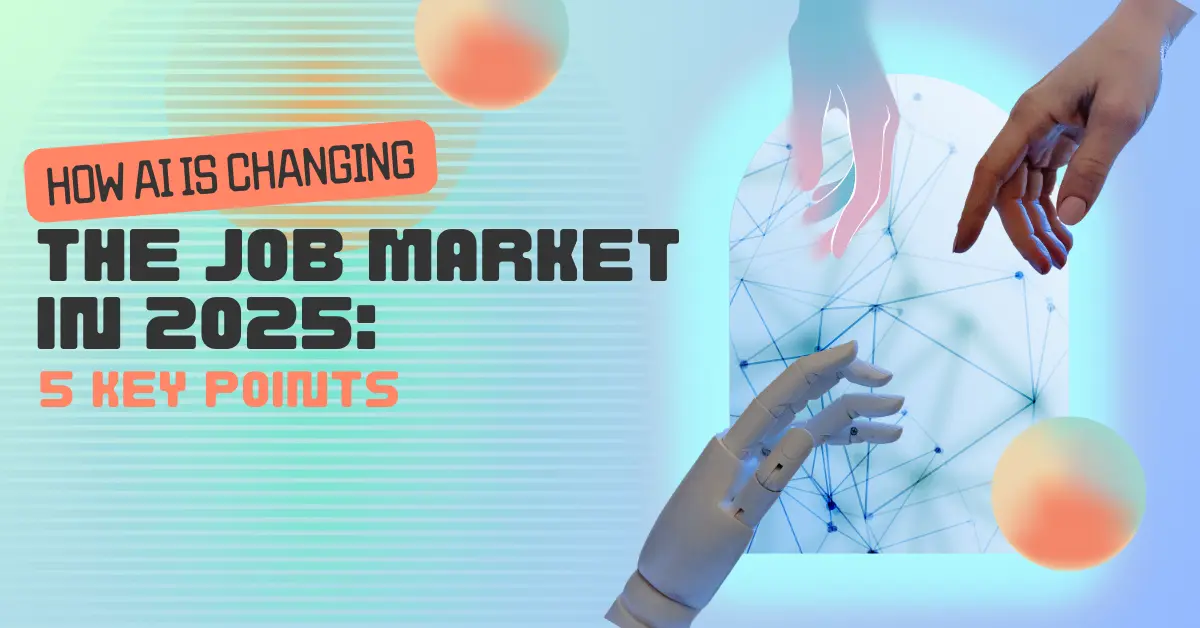
How AI Is Changing the Job Market in 2025: 5 Key Points
- 95
- 0
- 0
By 2025, AI will significantly impact the job market. It will automate many tasks, leading to the loss of some jobs but also creating new ones. People will need to acquire new skills, particularly in technology and data management. AI will make workers more efficient, but adaptability will be crucial. Continuous learning and staying updated with new technologies will be important for success. AI will play a key role in shaping future job opportunities, making it vital for individuals to stay prepared and develop skills that align with the changing work landscape.
How AI Is Changing the Job Market in 2025
The job market is going through big changes as artificial intelligence (AI) becomes more common in our daily work lives. We want to share the most important ways AI is affecting jobs and careers in 2025. Here are five key points that show how AI is reshaping the way we work:
AI is Creating New Job Roles
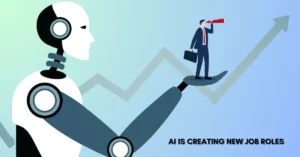
AI hasn’t only replaced jobs – it’s making new ones too. Companies now need:
- AI Trainers who help make AI systems better at understanding human needs
- AI Ethics Officers who make sure AI systems are fair and follow rules
- Data Cleanup Specialists who make sure AI systems use good information
- AI-Human Cooperation Managers who help teams work well with AI tools
Many of these positions didn’t exist five years back. Now, they’re some of the fastest-growing careers. For example, LinkedIn reports that AI trainer jobs have grown 350% in the last year alone.
Traditional Jobs Are Changing, Not Disappearing
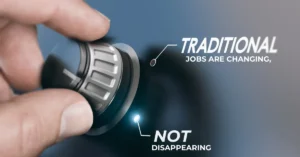
Instead of replacing humans completely, AI is changing how we do our existing jobs. Here’s what’s happening in different fields:
Healthcare: Doctors now use AI to spot diseases earlier and make better treatment plans. Nurses work with AI systems to track patient health more accurately.
Marketing: Marketing teams use AI to understand what customers want and make better ads. But humans still need to be creative and understand people’s emotions.
Customer Service: AI handles simple questions, while human agents focus on complex problems that need understanding and empathy.
Manufacturing: Workers team up with AI-powered robots instead of doing all the physical work themselves.
Skills That Matter Most in 2025
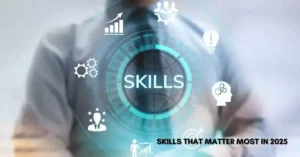
The skills employers want are changing because of AI. These skills are now very important:
Critical Thinking: Being able to check if AI’s suggestions make sense and knowing when to trust or question them.
AI Literacy: Understanding how AI works and how to use it well in your job.
Emotional Intelligence: Being good at things AI can’t do well, like understanding people’s feelings and building relationships.
Problem Solving: Finding creative solutions when AI tools don’t have all the answers.
Adaptability: Being ready to learn new things as AI keeps changing how we work.
Changes in How We Learn and Train

The way we learn job skills is different now:
- Many companies offer quick training programs to help workers learn new AI skills
- Online learning platforms have special courses about working with AI
- Schools and colleges now teach AI skills in most subjects
- Workers often need to keep learning throughout their careers to stay current with AI changes
Companies like Google, Microsoft, and Amazon now offer free AI training to help workers stay up-to-date. Many workers take short courses every few months to learn about new AI tools in their field.
The Rise of Human-AI Teamwork
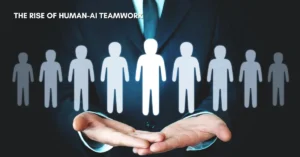
The biggest change might be how humans and AI work together. Most jobs now involve some kind of AI partnership:
Writers use AI to check their work and suggest improvements, but still create the main ideas themselves.
Architects use AI to test different building designs but make the final creative choices.
Financial Advisors use AI to analyze numbers but use their judgment to give personal advice to clients.
Teachers use AI to grade simple tasks but focus on helping students think deeply and solve complex problems.
What This Means for Workers
If you’re worried about AI and your job, here are some helpful things to know:
- Focus on building skills that AI isn’t good at, like creative thinking and working well with people
- Learn how to use AI tools in your field – most companies now expect this
- Be ready to keep learning new things as AI keeps developing
- Look for ways AI could help you do your job better instead of seeing it as a threat
- Think about moving into one of the new job areas AI is creating
Looking Ahead
The job market will keep changing as AI technology improves. But these changes bring opportunities along with challenges. Workers who learn to work well with AI, rather than compete against it, will have the best chances for success.
The most successful workers in 2025 are those who see AI as a helpful tool rather than a replacement. They use AI to do routine tasks while focusing their time on work that needs human skills like creativity, judgment, and emotional understanding.
Remember: AI is changing how we work, but it’s not removing the need for human workers. Instead, it’s creating new ways for people to use their uniquely human abilities in their jobs.
FAQs
How will AI affect jobs in 2025?
AI will automate repetitive tasks, causing some jobs to disappear, but it will also create new opportunities in tech, data analysis, and AI management. People will need to learn new skills to adapt.
Which jobs will be most impacted by AI?
Jobs involving routine tasks, like data entry, manufacturing, and customer support, will be most affected. However, jobs in AI development, programming, and data analysis will see growth, offering new career paths for skilled workers.
Will AI take over all jobs in 2025?
No, AI won’t take over all jobs. While it will automate many tasks, human skills like creativity, emotional intelligence, and problem-solving will remain in demand. People will need to work alongside AI to stay relevant.
How can I prepare for the AI-driven job market?
To prepare, focus on learning new skills, especially in technology, data analysis, and AI. Upskilling through courses, certifications, and hands-on experience will help you stay competitive in the evolving job market.
What industries will see the most AI growth?
Industries like healthcare, finance, manufacturing, and customer service will experience significant AI growth. These sectors will use AI to improve efficiency, enhance decision-making, and create new solutions, opening doors for skilled professionals.
Also Read:
5 Best Side Hustles in 2025 to Boost Your Income
How to Ace Your Next Job Interview: 5 Tips
References:
https://en.wikipedia.org/wiki/Artificial_intelligence
Disclaimer:
The information on “How AI Is Transforming the Job Market in 2025” is for informational purposes only. AI’s impact on jobs can vary by industry and region. Predictions may change, so stay informed and adapt accordingly.



